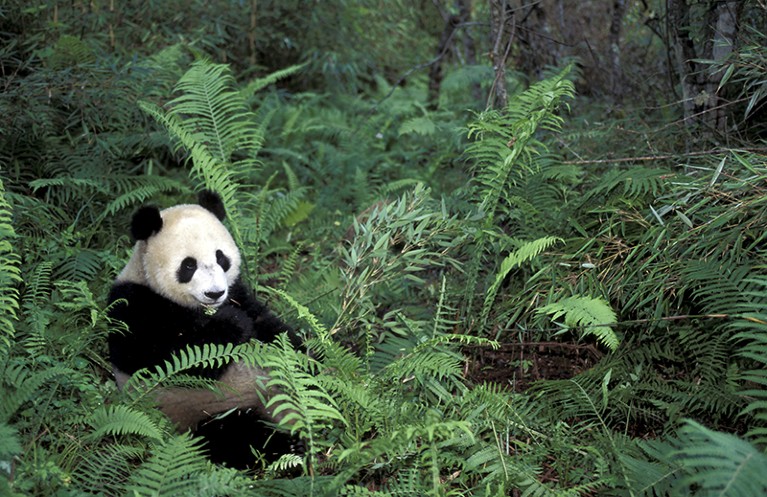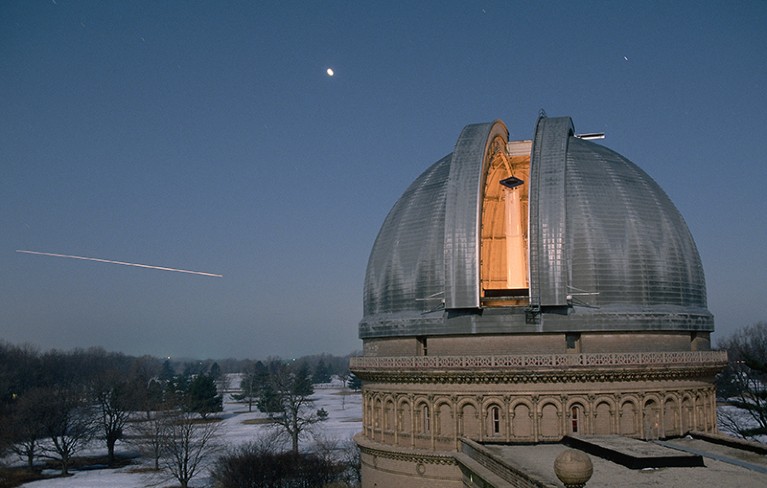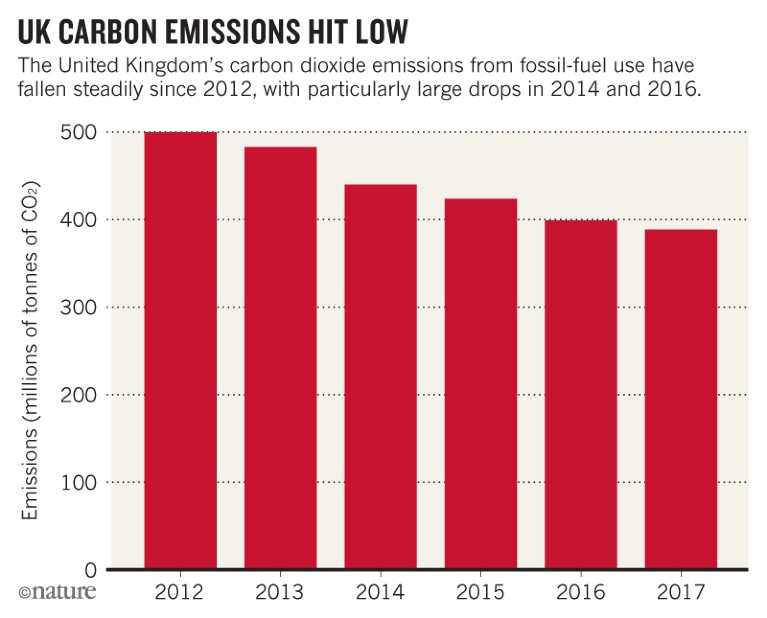CONSERVATION
China plans huge park for giant pandas China is investing billions of yuan to create a massive conservation area for giant pandas (Ailuropoda melanoleuca). The park will connect fragmented reserves and cover 27,134 square kilometres across Sichuan, Shaanxi and Gansu provinces. Sichuan is home to 80% of the world’s pandas. On 6 March, Sichuan’s forestry department, the Bank of China and other parties agreed to invest 10 billion yuan (US$1.58 billion) in the park over the next five years. Current panda habitat represents a tiny fraction of its former range across central and southeastern China. Conservation efforts have helped boost the population of wild pandas to about 1,900.

Credit: Lynn M. Stone/naturepl.com
Big-game trophies Hunters from thew United States can now import trophies from big game — such as elephants — from several African countries, the Associated Press reported on 6 March. The US Fish and Wildlife Service will consider imports of tusks, hides and other body parts from animals shot for sport, including African elephants (Loxodonta africana), lions (Panthera leo) and a type of antelope called a bontebok (Damaliscus pygargus). Decisions will be made “on a case-by-case basis”, according to a memorandum that the agency quietly released on 1 March. The decision overturns a ban on some big-game trophies put in place by former president Barack Obama’s administration.
POLICY
China reshuffle China announced plans for a dramatic government overhaul on 13 March. Changes include plans for the Ministry of Science and Technology to oversee the National Natural Science Foundation of China, the country’s main funder of scientific research, as well as another agency that recruits and certifies foreigners with expertise in areas including science, technology and economics. A restructured and expanded intellectual-property office will be given more power to enforce such rights, and a new ministry of ecological environment will be tasked with enhancing environmental protection and will be given significant powers to monitor pollution and enforce laws. It replaces the former Ministry of Environmental Protection.
POLITICS
China presidency China’s Communist Party has abolished its constitutional two-term limit on the presidency. The rule change, approved on 11 March by the country’s parliament, allows current president Xi Jinping to remain in power for life. Xi’s second term is due to end in 2023. The announcement prompted mixed reactions, with some commentators outside China critical of the plan. Chinese state media say the change is necessary to maintain the country’s stability. Xi has been a strong proponent of scientific research, and his government has enacted long-term plans to make the country a world leader in fields including artificial intelligence and quantum communication.
AWARDS
Brain prize The 2018 Brain Prize has been awarded for work on the genetic and molecular basis of Alzheimer’s disease. The Lundbeck Foundation in Copenhagen announced the winners on 6 March. Bart De Strooper at the University of Leuven, Belgium, Michel Goedert at the University of Cambridge, UK, Christian Haass at Ludwig Maximilian University of Munich, Germany, and John Hardy at University College London will share the €1-million (US$1.23-million) prize. There is no treatment for Alzheimer’s disease, which affects tens of millions of people worldwide.
EVENTS
Observatory closes On 7 March, the University of Chicago in Illinois announced that it will cease operations at Yerkes Observatory (pictured), a storied astronomical institution in Williams Bay, Wisconsin, by 1 October. Telescopes at Yerkes, which opened in 1897, have been used to deduce the spiral nature of the Milky Way and to illuminate the behaviour of stars at the ends of their lives. But, in recent years, the university has shifted its research to newer, larger facilities and used Yerkes for education and outreach. Those programmes will now move to its Hyde Park campus in Chicago.

Credit: Roger Ressmeyer/Corbis/VCG/Getty
UK strike hope Union leaders and employers at the centre of a huge strike by UK academics have reached a deal that could see the walkout suspended. Academics at more than 60 institutions have been striking intermittently since 22 February over changes that would see their pension income go from having a guaranteed element to being entirely dependent on investment return, leaving them worse off in retirement. Universities UK, which represents the employers, said that the change was needed to tackle a deficit in the pension fund. On 12 March, the University and College Union (UCU) and Universities UK agreed on a revised proposal that would return some defined benefits. As Nature went to press, UCU representatives were scheduled to discuss whether to approve the deal.
Climate review The US National Academies of Science, Engineering, and Medicine (NASEM) released its review of a draft of the next US National Climate Assessment on 12 March. The assessment is a legally mandated report from government researchers on the state of climate-change science and is published every four years. Climate scientists and watchdog groups have been monitoring the process to ensure that officials in President Donald Trump’s administration — some of whom have questioned climate science — do not interfere with the report. Thus far, the process has proceeded smoothly. NASEM endorsed the draft assessment, as well as an accompanying draft report on the carbon cycle, suggesting only minor editorial changes.
BUSINESS
Cancer test On 6 March, 23andMe, a DNA-sequencing company based in Mountain View, California, gained approval from the US Food and Drug Administration to offer genetic breast-cancer tests directly to consumers. The tests look for mutations in two genes — BRCA1 and BRCA2 — linked to breast and ovarian cancer, but they identify only three out of more than 1,000 known mutations in those genes. Other tests can identify many more mutations in the genes, but people need to see a physician to access the tests. The three mutations covered by the 23andMe product occur in about 2% of Ashkenazi Jewish women, but they are extremely rare in other populations.
PEOPLE
Genome pioneer John Sulston, a Nobel-prizewinning British biologist, died on 6 March. Beginning in the 1970s at the Medical Research Council Laboratory of Molecular Biology in Cambridge, UK, Sulston painstakingly recorded each cell division in the development of the roundworm Caenorhabditis elegans, work that earned him a share of the 2002 Nobel Prize in Physiology or Medicine. Between 1992 and 2000, he served as the founding director of the Wellcome Sanger Institute in Hinxton, UK, where he played a part in the Human Genome Project.
Policy violations On 7 March, Columbia University in New York City removed renowned neuroscientist Thomas Jessell. The move was based on the results of an investigation revealing “serious violations” of the school’s policies governing the behaviour of faculty in an academic environment, according to a university statement. It did not provide details of the violations in question. Jessell’s laboratory, which included around two dozen graduate students, postdoctoral researchers and other staff, will be shuttered. The university stated that it would help the students, researchers and staff to continue with their studies and careers.
NASA departure NASA’s acting administrator, Robert Lightfoot, announced his retirement on 12 March — leaving the agency’s leadership even more uncertain as work begins on plans to return astronauts to the Moon. Last September, US President Donald Trump tapped Representative James Bridenstine (Republican, Oklahoma) to head NASA. Lawmakers in the Senate have held up the nomination, citing Bridenstine’s political background and his statements expressing doubt about anthropogenic climate change. Lightfoot has run the agency in an acting capacity for 14 months.
TREND WATCH
An analysis in the United Kingdom shows that carbon dioxide emissions from fossil fuels fell by 2.6% in 2017, to levels last seen in 1890. The decrease was the result of a decline in the use of coal and natural gas, and it occurred despite a slight rise in the consumption of petroleum and oil. The analysis, by London-based climate watchdog Carbon Brief, is based on newly released government figures. The country’s emissions have fallen every year since 2012, with the steepest drops in 2014 and 2016.

Source: Carbon Brief

 The rise and fall and rise again of 23andMe
The rise and fall and rise again of 23andMe


